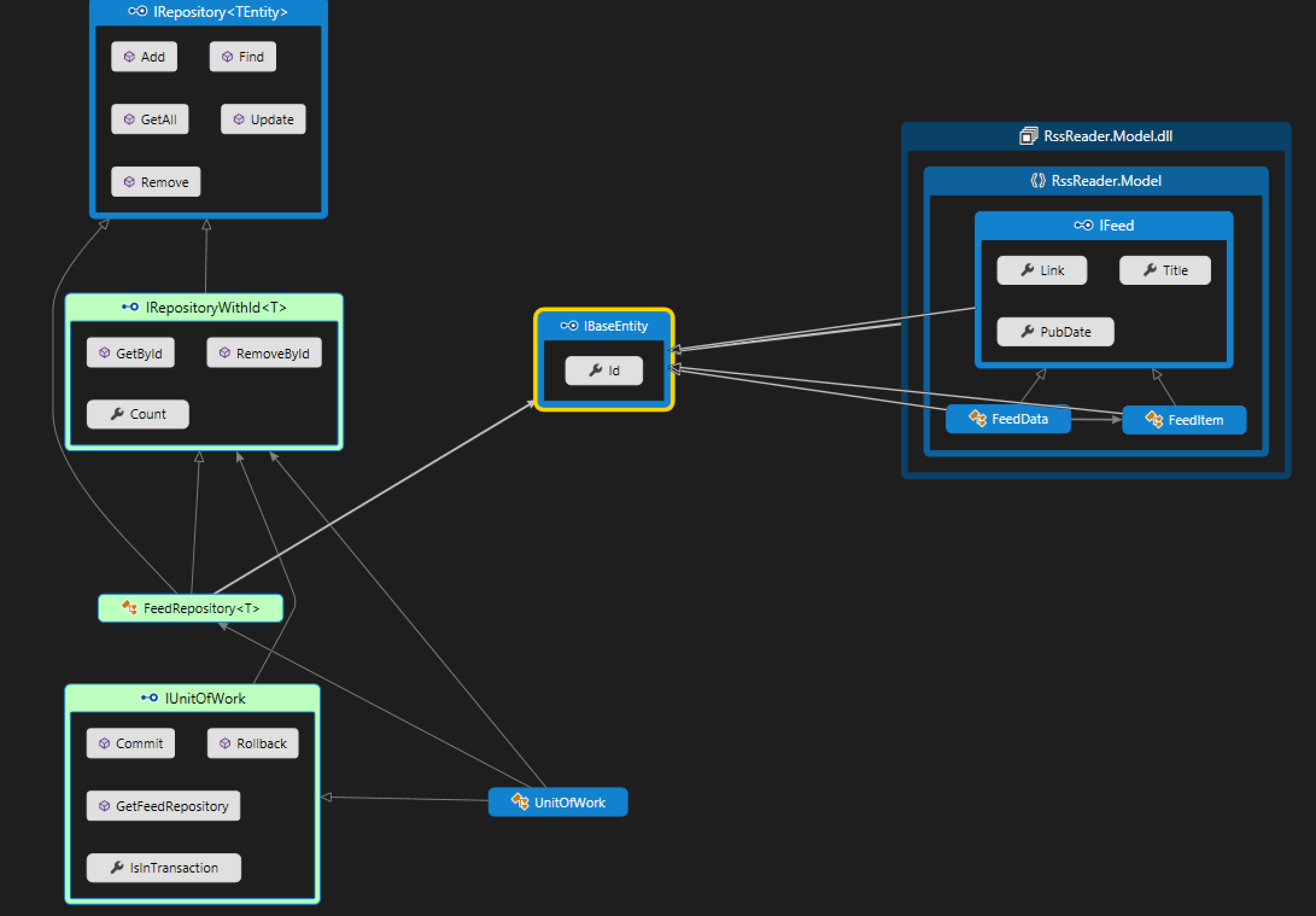Continuation of this question: Unit of Work with Generic Repository Pattern MVVM, vol. 3
I have made some changes.
- The methods
GetFeedBySomething()have been replaced byFind() GetRepository()has been added toUoW- I separated
DALfromModel ModelinheritsIBaseEntityfromDAL(not sure is it correct)IRepositoryWithIdmadeTEntityto becomeIBaseEntitybecause I need to haveIdproperty. (again not sure is it correct, maybe shall I usereflection?)
This is my code map: 
And here are my code
DAL CLASSES
IRepository
public interface IRepository<TEntity> where TEntity : class
{
TEntity Add(TEntity entity);
TEntity Update(TEntity entity);
IQueryable<TEntity> Find(System.Linq.Expressions.Expression<Func<TEntity, bool>> predicate);
IEnumerable<TEntity> GetAll();
void Remove(TEntity entity);
}
IRepositoryWithId
public interface IRepositoryWithId<T> : IRepository<T> where T : class, IBaseEntity
{
int Count { get; }
T GetById(int feedId);
void RemoveById(int feedId);
}
IBaseEntity
public interface IBaseEntity
{
int Id { get; set; }
}
IFeedRepository
internal class FeedRepository<T> : IRepositoryWithId<T>
where T : class, IBaseEntity, new()
{
private readonly SQLiteConnection _dbConnection;
protected Lazy<IList<T>> _feeds;
public int Count
{
get
{
if (this._feeds.IsValueCreated)
return this._feeds.Value.Count;
return this._dbConnection.Table<T>().Count();
}
}
public FeedRepository(SQLiteConnection dbConnection)
{
this._dbConnection = dbConnection;
this._feeds = new Lazy<IList<T>>(() => this._dbConnection.Table<T>().ToList());
}
public T Add(T feed)
{
if (this._feeds.IsValueCreated)
this._feeds.Value.Add(feed);
this._dbConnection.Insert(feed);
return feed;
}
public T GetById(int feedId)
{
return this._feeds.Value.Where(feed => int.Equals(feed.Id, feedId)).SingleOrDefault();
//return this._feeds.Value.Where(feed => int.Equals(typeof(T).GetRuntimeProperty("Id").GetValue(feed), feedId)).SingleOrDefault();
}
public T Update(T feed)
{
int indexOfFeed = this.GetIndexOfFeed(feed);
if (indexOfFeed != -1)
this._feeds.Value[indexOfFeed] = feed;
this._dbConnection.Update(feed);
return feed;
}
public IEnumerable<T> GetAll()
{
return this._feeds.Value;
}
public IQueryable<T> Find(System.Linq.Expressions.Expression<Func<T, bool>> predicate)
{
if (predicate != null)
return this._feeds.Value.AsQueryable().Where(predicate);
return this._feeds.Value.AsQueryable();
}
public void Remove(T feed)
{
int indexOfFeed = this.GetIndexOfFeed(feed);
if (indexOfFeed != -1)
this._feeds.Value.RemoveAt(indexOfFeed);
this._dbConnection.Delete(feed);
}
public void RemoveById(int feedId)
{
T feed = this.GetById(feedId);
if (feed != null)
this.Remove(this.GetById(feedId));
}
private int GetIndexOfFeed(T feed)
{
if (this._feeds.IsValueCreated)
{
//int id = (int)typeof(T).GetRuntimeProperty("Id").GetValue(feed);
int indexOfFeed = this._feeds.Value.IndexOf(this.GetById(feed.Id));
return indexOfFeed;
}
return -1;
}
}
IUnitOfWork
internal interface IUnitOfWork
{
bool IsInTransaction { get; }
IRepositoryWithId<TEntity> GetFeedRepository<TEntity>() where TEntity : class, IBaseEntity, new();
void Commit();
void Rollback();
}
UnitOfWork
public class UnitOfWork : IUnitOfWork
{
private readonly SQLiteConnection _dbConnection;
private readonly Dictionary<Type, object> _repositories;
public bool IsInTransaction
{
get { return this._dbConnection.IsInTransaction; }
}
public UnitOfWork(SQLiteConnection dbConnection)
{
this._repositories = new Dictionary<Type, object>();
this._dbConnection = dbConnection;
this._dbConnection.BeginTransaction();
}
public IRepositoryWithId<TEntity> GetFeedRepository<TEntity>()
where TEntity : class, IBaseEntity, new()
{
if (this._repositories.Keys.Contains(typeof(TEntity)))
return this._repositories[typeof(TEntity)] as IRepositoryWithId<TEntity>;
var repository = new FeedRepository<TEntity>(this._dbConnection);
this._repositories.Add(typeof(TEntity), repository);
return repository;
}
public void Commit()
{
this._dbConnection.Commit();
}
public void Rollback()
{
this._dbConnection.Rollback();
}
}
MODEL CLASSES
IFeed
public interface IFeed : IBaseEntity
{
string Title { get; set; }
Uri Link { get; set; }
DateTime PubDate { get; set; }
}
FeedData and FeedItem
public sealed class FeedData : IFeed, INotifyPropertyChanged { }
public sealed class FeedItem : IFeed, INotifyPropertyChanged { }
And now I have some questions about:
IBaseEntityis it necessary or shall I usereflection
